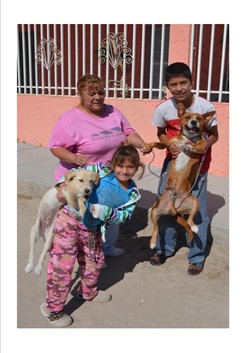At first glance, Ciudad Juarez’s violent reputation might seem overstated — one can scan the city’s skyline and see many signs of a prosperous Mexico: new hotels, banks and shopping malls and well-stocked grocery stores.
“It’s possible to come here to Juarez and think everything is wonderful,” said Juan Pablo Guttierez, a Presbyterian with a children’s ministry in Granjas del Desierto, an extremely poor neighborhood south of Juarez. “In fact, one asks, ‘Where’s the violence?’ but the reality is the surface hides the truth. There is terrible violence and extreme poverty.”
The city’s poor residents face problems typical in poverty-stricken areas: lack of pre- and post-natal care, hunger, malnutrition, a weak education system and overworked and underpaid parents.
In the countryside, residents face poor housing, inadequate transportation systems and a lack of potable water and electricity.
“Pasos de Fe (one of Presbyterian Border Ministry’s six bi-national sites) works to alleviate some of the community’s most fundamental needs by providing a library and computer lab, technical training, English classes, health clinics, counseling and Christian education,” said the Rev. Mercedes Romo Castro, coordinator of Pasos de Fe and pastor of Iglesia Presbiteriana Verdad y Fe (Truth and Faith Presbyterian Church).
Pasos de Fe seeks to strengthen existing churches, plant new churches and serve the social needs of the communities of Juarez.
At the Pasos de Fe: Verdad y Esperanza por Tu Vida (Steps of Faith: Truth and Hope for Your Life) community center, children have a safe place to do homework. Outfitted with six old and slow computers, the library is a resource that could use updating.
“Our biggest problem in the work is inhibited by lack of funding and personnel,” said the Rev. Roberto Mendoza of Prince of Peace Presbyterian Church, one of few Presbyterian churches that existed along the border before PBM and Pasos de Fe.
To help fill the gaps of funding and personnel, Castro volunteered to work 20 hours a week as the Mexico coordinator to assure that Pasos continues its work during its reorganization. In August 2011, the National Presbyterian Church of Mexico voted to end its relationship with the Presbyterian Church (U.S.A.) in response to the PC(USA)’s decision to allow the ordination of sexually active gays and lesbians. Because of that decision, Pasos de Fe does not have a U.S. coordinator, as is the custom with the PBM sites.
One imaginative idea “was to deal with a health problem at the only place we can: the family dog,” Castro said, adding that rabies is rampant in the area. “A rabies vaccination costs about $45 U.S. (slightly less than the average weekly wage in the factories in Juarez). Needless to say the choice between food and a vaccine is hardly a choice.”
But why in such poverty are there so many dogs? Answer: security. Dogs alert families to danger in neighborhoods that experience many robberies.
“Rabies, like poverty is a community health issue,” Castro said. “The mice and rats carry the disease from place to place in the city. The cats kill and eat the mice and rats. When the cats become infected they then attack dogs which become infected and attack people. We can’t catch all the cats, but we can get most of the dogs. This is an important ministry, a sign that God loves these people and their pets.”
Pasos de Fe held the rabies clinic with the help of a Christian veterinarian and his staff. The vet provided all the supplies, and on Saturday morning dogs came to church to be vaccinated.
As one woman with dog and children in tow said, “We cannot afford the vaccine. Thanks to God someone cares enough to protect our family, our dog and our community — a sign God loves us.”
Parrish W. Jones is an ordained minister member of St. Augustine Presbytery who lives in St. Augustine, FL where he teaches philosophy at St. Johns River State College, and writes for PNS and other media outlets. He is presently traveling the U.S./Mexico border researching a book on Presbyterian Border Ministry. You can learn more about his work at www.presbyteriansonthefrontier.net.

